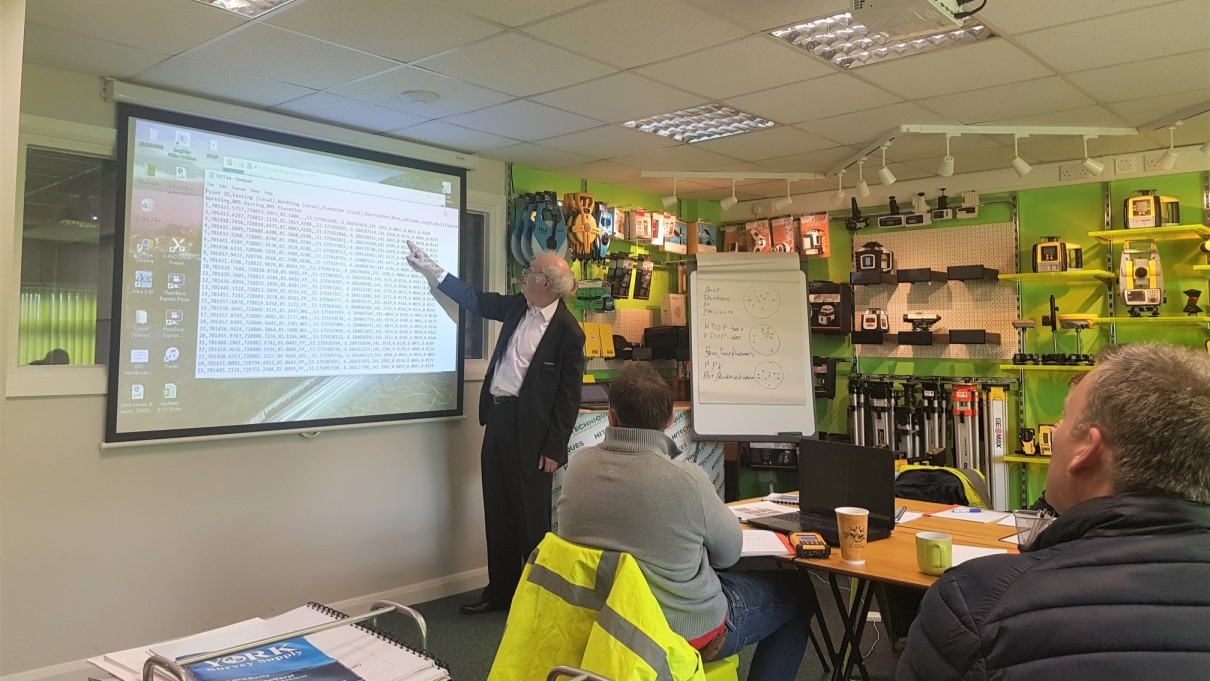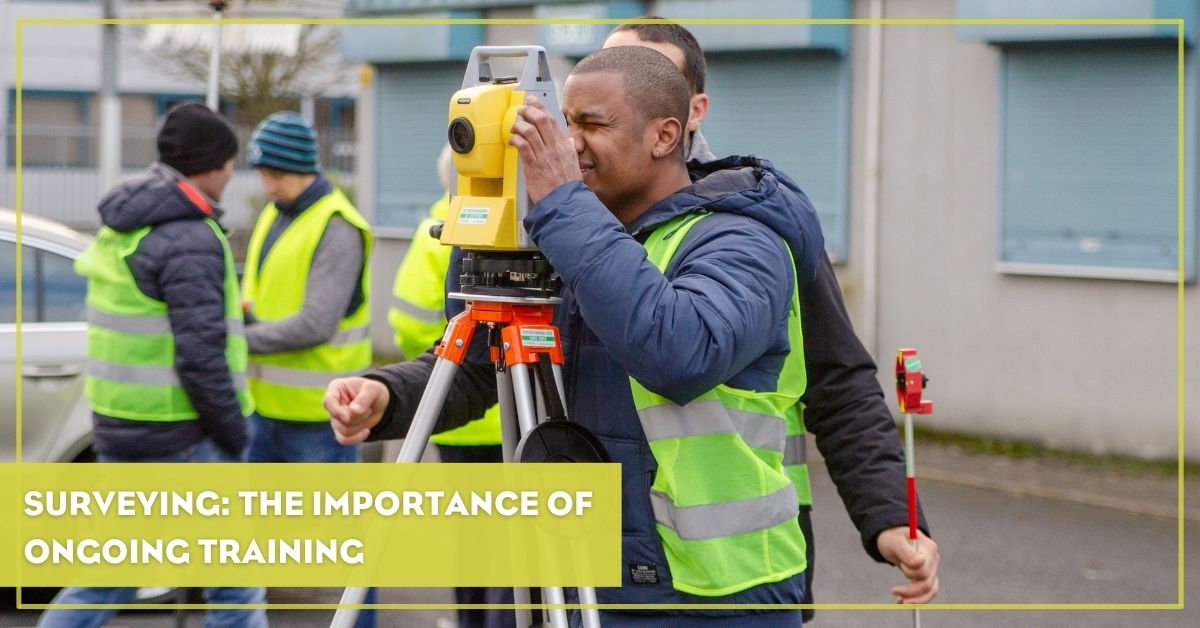The Importance of Ongoing Training for Surveying Equipment Users: What You Need to Know
Posted by Philip Hanrahan B.E., B.A., M.I.E.I. on 2nd May 2023
Surveying equipment is a critical tool in many industries including construction, engineering, mining and land surveying. The equipment is used to measure and map land, structures and infrastructure providing essential information for project planning and development. For instance, in the construction industry alone, surveying equipment is used in 85% of all construction projects worldwide highlighting its importance.
However, the effectiveness of surveying equipment depends heavily on the knowledge and skills of the people using it. A survey by Trimble found that up to 50% of construction professionals lack adequate training in surveying equipment operation and maintenance indicating a significant knowledge gap in the industry. This gap can lead to inaccurate data, costly errors and even safety hazards on the job.
To address these issues, ongoing training for surveyors and construction engineers is crucial. By providing regular training and education, surveying equipment users can stay up-to-date with the latest technology and techniques which can improve accuracy, efficiency and safety on the job. Furthermore, ongoing training can help surveying equipment users maintain their certification and stay competitive in the job market.
In this article, we’ll explore the importance of ongoing training for surveying equipment users and the benefits it provides for accuracy, efficiency and safety on the job. We’ll also discuss common training methods, the importance of certification and provide examples of companies that have invested in ongoing training.
The Benefits of Ongoing Training
Ongoing training for surveying equipment users provides numerous benefits that can help improve the accuracy, efficiency and safety of surveying work.
Firstly, ongoing training helps improve the accuracy of surveying work by keeping users up-to-date with the latest technology and techniques. Surveying equipment is continually evolving and ongoing training ensures that users are aware of the latest advancements and how to use them correctly. This knowledge helps users to produce more accurate and reliable results which is essential in industries such as construction and engineering.
Secondly, ongoing training improves the efficiency of surveying work. By learning new techniques and tools surveying equipment users can perform their work faster and with greater precision. This can help to reduce the time required for data collection and analysis ultimately resulting in cost savings for the organisation.
Thirdly, ongoing training improves safety and reduces the risk of accidents on the job. Surveying work often involves working in hazardous environments such as construction sites, highways or railways. Proper training ensures that surveying equipment users are aware of the hazards and how to mitigate them. This knowledge can help to prevent accidents, injuries and even fatalities on the job.
Common Training Methods
There are several training methods available which include product-specific training, on-site training, online courses and workshops.
Product-specific training focuses on teaching users how to operate and maintain specific surveying equipment. Manufacturers often offer product-specific training to their customers either through on-site training or online courses. For example, Trimble offers a range of online courses on their Trimble Knowledge Center covering topics such as surveying workflows, data management and machine control.
On-site training involves a trainer visiting the organisation's site to provide training to the employees. The trainer may use the organisation's own surveying equipment to provide hands-on training. On-site training is convenient for organisations as it reduces the cost and time required to send employees to an external training facility.
Online courses are another popular training method for surveying equipment users. Online courses provide a convenient and flexible way for users to learn new skills and techniques. Users can access the courses from anywhere and at any time allowing them to fit training around their work and personal schedules. Trimble offers a range of online courses through their Trimble Knowledge Center, including courses on surveying workflows, data management, and machine control.
Workshops are another training method that is popular with surveying equipment users. Workshops are short, intensive courses that focus on specific topics or technologies. For example, Topcon Positioning Systems offers a range of workshops on topics such as total station operation, data collection and machine control. Workshops are typically conducted in small groups allowing for more personalised training. Workshops provide hands-on training and the opportunity to interact with other professionals in the field. However, workshops may require travel expenses and can be time-consuming.
Hitechniques Surveying Training Courses
To ensure proficiency with surveying equipment, it’s important to invest in training courses that teach specific skills and techniques. At Hitechniques we provide training as part of our customer care but also for individuals and groups that are interested in modern surveying methods. Our training offer includes:
- GNSS/GPS Training Course
Our GNSS/GPS Training Course is perfect for professionals who want to improve their RTK GNSS measurement skills, gain more site information and reduce their time spent in the office connecting dots. Taught by a former site engineer and lecturer at Trinity College, this course covers topics such as GPS fundamentals, field techniques and equipment troubleshooting. By the end of this course, you'll be more confident in using modern technology on site, completing jobs faster and increasing your revenue with better orders from contractors.
- Total Station Training Course
Our Total Station Training Course teaches you how to quickly set up the total station, station and orient, set out lines and levels for buildings, kerbs, manholes and gullies. You'll also learn how to use free-stationing to avoid obstacles when setting out, calculate areas and volumes and prepare drawings in AutoCAD. With our course, you'll be able to be more confident on the site and increase your efficiency in performing survey tasks.
- Matterport 3D Capture Training
Our Matterport 3D Capture Training Course, presented by a leading Matterport Service Provider in Ireland, teaches you how to use Matterport Capture technology to create immersive 3D models of any space. You'll also gain an understanding of uses and benefits of 2D floor plans, TruePlan and MatterPak data sets. With this course, you'll be able to tap into the full potential of 3D virtual tours and provide your clients with a better visual understanding of the surveyed space.
- In-House & Bespoke Training Courses
Our In-House & Bespoke Training Courses are designed to develop your team's surveying skills while building on their existing workplace experience. We offer tailored instrument courses, on-site setting out training specific to your needs, and advanced surveying courses for existing users. With our GNSS and Total Station training, your team will be able to set out and prepare drawings themselves, using the equipment you already have on site or can easily hire. By reducing the need to call survey companies for updates, queries, or adjustments, you'll save time and money while increasing efficiency.

The Cost of Ongoing Training
Despite the numerous benefits of ongoing training for surveying equipment users, some companies may be hesitant to invest in it due to the associated costs. Training can be expensive and some companies may not see the immediate benefits of investing in it. Additionally, training can take employees away from their work for a period of time which can result in lost productivity and additional costs for the organisation.
However, the cost of ongoing training can be outweighed by the many benefits. Investing in ongoing training can help companies to reduce the risk of errors and inaccuracies in their surveying work, which can save the company money by reducing the need for rework or revisions, which can be costly and time-consuming. For example, if a surveyor makes a mistake while conducting a land survey and the mistake is not detected until after construction has begun, it can cost the company thousands or even millions of euros to correct the error.
Investing in ongoing training can also improve the efficiency of surveying work reducing the time required for data collection and analysis. This can result in cost savings for the organisation as the same amount of work can be completed in less time. For example, if a surveying team can complete a project in two weeks instead of three weeks the organisation can save money on labour costs and other expenses associated with the project.
Finally, investing in ongoing training can improve safety and reduce the risk of accidents on the job. This can save the organisation money by reducing the costs associated with workplace injuries such as medical expenses, workers' compensation and lost productivity. For example, if a surveyor receives training on how to properly use safety equipment and prevent falls, the organisation can reduce the risk of injuries and avoid the associated costs.
The Importance of Certification
Certification is an important aspect of ongoing training for users worldwide. It demonstrates that a surveyor has the knowledge and skills necessary to perform their job safely and effectively. It also provides assurance to clients that the surveyor is qualified to perform the work required.
In Northern Ireland, surveyors must meet certain requirements to become licensed. To obtain a licence, surveyors must hold a degree in surveying or a related subject, complete two years of practical training, pass an exam and meet certain professional requirements. To maintain their licence, surveyors in Northern Ireland must complete a certain amount of continuing professional development (CPD) each year, which can be done through attending courses, workshops or conferences related to surveying.
In the EU, surveyors can obtain certification through organisations such as the European Federation of National Surveying Associations (FIG). FIG offers a range of professional qualifications and training courses for surveyors which can help them develop their skills and demonstrate their expertise to clients. By obtaining certification from organisations such as FIG, surveyors in the EU can differentiate themselves in the marketplace and demonstrate their commitment to their profession.
Conclusion
Ongoing training for surveying equipment users is crucial in ensuring accuracy, efficiency and safety in the workplace. While some companies may be hesitant to invest in training due to the cost, the benefits of improved performance and cost savings outweigh the initial investment. Certification is also essential for surveying equipment users, and ongoing training can help maintain certification requirements. It is vital that companies prioritise ongoing training for their surveying equipment users to stay up-to-date. Ultimately, investing in upskilling will lead to better outcomes for both the company and its employees.
Stay ahead in surveying: Invest in training today!

